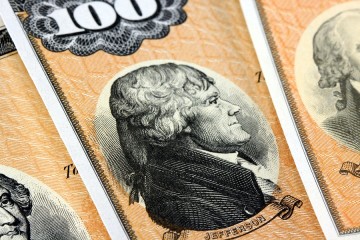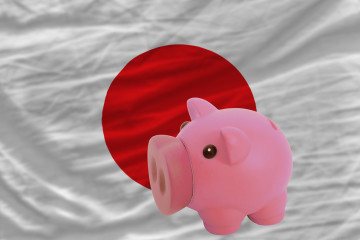Bloomberg Business: Dollar Jumps Versus Emerging Peers; Japan Stocks Fuel Asia Gains
Copyright 2015 Bloomberg.
NKEO5Y6K50Z1
(Bloomberg) — The dollar climbed against Asian emerging- market currencies and maintained gains versus major peers, while Australian bonds fell. Japanese shares drove the regional index toward its biggest monthly gain since 2013.
The greenback rose at least 0.2 percent by 10 a.m. in Tokyo against the currencies of South Korea, Malaysia and Thailand, while the Bloomberg Dollar Spot Index headed for an eighth straight monthly advance. Yields on Australian 10-year notes climbed five basis points, as U.S. Treasuries held losses. The MSCI Asia Pacific Index is up 4.3 percent in February, with Japan’s Topix index rising 0.3 percent Friday, extending its jump in the month. Standard & Poor’s 500 Index futures lost 0.2 percent. U.S. oil held below $50 a barrel. Investors trying to gauge the timeline for U.S. interest- rate increases seized on the bigger-than-forecast climb in core inflation reported Thursday, even as broader consumer prices fell the most since 2008. Federal Reserve Chair Janet Yellen signaled this week inflation is too low to warrant tightening policy, while data Friday may see U.S. fourth-quarter economic growth revised down. Oil’s slump crimped Japanese price growth, which slowed more than estimated in January. “Headline is known information, but the core measure surprised to the upside,” Daniel Brehon, a New York-based strategist at Deutsche Bank AG, said by phone. “Given that inflation surprises have been negative around the world, anything above consensus is a sign for optimism and a sign for higher rates in the U.S.”
Dollar Strength
The Bloomberg dollar gauge, which tracks the greenback versus 10 major peers, retreated 0.2 percent after jumping 0.9 percent on Thursday, as the U.S. currency traded near its strongest level since 2003 against the euro. The 19-nation euro was little changed at $1.1212 Friday, while the yen was steady at 119.28 per dollar following a 0.5 percent drop. The yen has decreased 1.5 percent in February, the worst performance among 11 Asian currencies tracked by Bloomberg. The dollar added 0.2 percent against the Korean won, gained 0.5 percent to the Malaysian ringgit and appreciated 0.2 percent versus the Thai baht, trimming that currency’s 1.2 percent advance this month, still the biggest in Asia. The yen’s retreat fueled gains in Japanese shares, with the Topix headed for a 7.8 percent climb in the month, its biggest increase since September 2013. Japanese consumer prices excluding fresh food rose 2.2 percent from a year earlier in January, trailing the 2.3 percent increase estimated by economists and slowing from 2.5 percent in December.
Fed Commentary
Australia’s S&P/ASX 200 Index was little changed, while the Kospi index in Seoul fell 0.2 percent. The MSCI All-Country World Index — which touched a record Thursday amid increased monetary stimulus from Japan to Europe — was also little changed.
Fed Bank of St. Louis President James Bullard said Thursday that the Fed Open Market Committee should remove its pledge to be “patient” in raising rates in March to give it flexibility to tighten policy as soon as June. The central bank has kept key rates near zero since 2008. “If we take it out, then we can move at any of the meetings during the summer,” Bullard, a non-voting member of the FOMC this year, said in an interview with CNBC. “But we don’t have to. We can make it be data dependent, which is what I’d like.”
‘Can’t Wait’
Feb Bank of San Francisco President John Williams, who votes on policy this year, expects inflation to return to the central bank’s target level of 2 percent by the end of 2015, and advocated for raising borrowing costs before then.
“We can’t wait until inflation is back to 2 percent and we’re at full employment before we start removing accommodation,” Williams said in a Fox Business Network interview. The U.S. consumer-price index declined 0.7 percent in January after dropping 0.3 percent in the previous month, the data Thursday showed. The median of economists’ forecasts compiled by Bloomberg called for a 0.6 percent decrease. Core inflation rose 0.2 percent from December, exceeding the 0.1 percent projected increase. Australian bonds due in a decade followed the Thursday drop in Treasury notes, with yields climbing to 2.46 percent, the first increase in four days. Rates on similar maturity Treasuries were little changed at 2.02 percent after jumping six basis points in New York.
Oil, Metals
West Texas Intermediate crude climbed 1.4 percent to $48.86 a barrel after tumbling 5.5 percent on Thursday. WTI’s discount to Brent crude widened to the most in 13 months after report Wednesday showed U.S. crude supplies rose to 434.1 million barrels last week, the highest level in weekly estimates from the Energy Information Administration beginning in 1982.
Both grades sank about 50 percent in 2014 amid signs of a global glut in the commodity and as Saudi Arabia led a decision in November by the Organization of Petroleum Exporting Countries to maintain the group’s output. Gold for immediate delivery added 0.1 percent to $1,210.30 an ounce, cutting its February retreat to 5.7 percent. Silver climbed 0.4 percent, while copper futures on the Comex dropped 0.1 percent after the metal surged 2 percent in London Thursday.
To contact the reporters on this story: Emma O’Brien in Wellington at eobrien6@bloomberg.net; Andrea Wong in New York at awong268@bloomberg.net To contact the editors responsible for this story: Emma O’Brien at eobrien6@bloomberg.net Sarah McDonald







No Comment